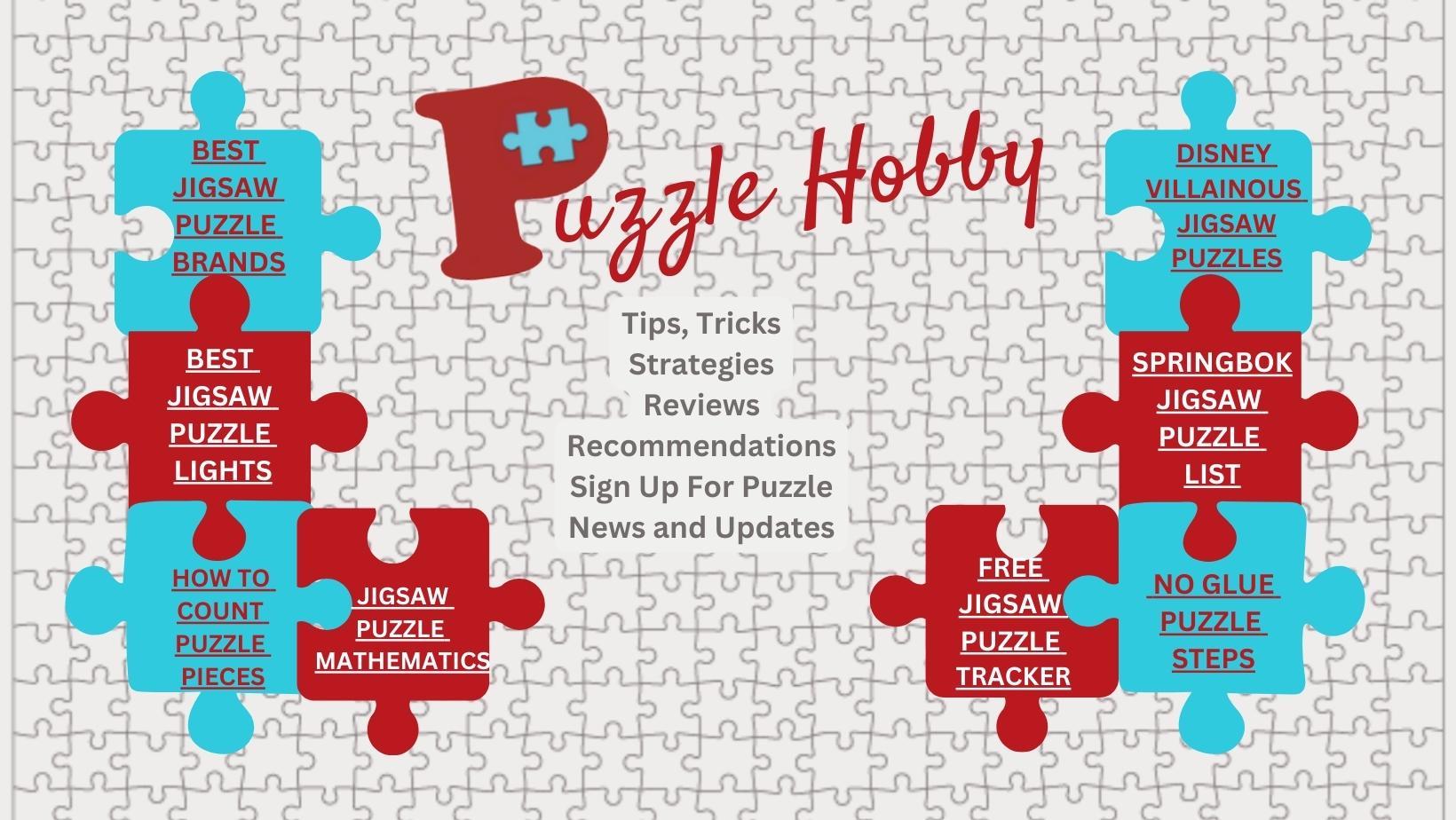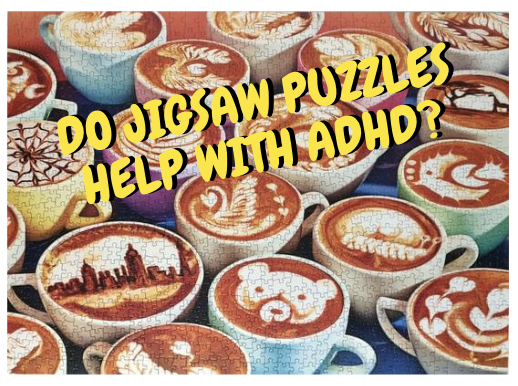 |
 |
- FAQ's 100 Questions
- Best Puzzle Brands
- Activities/Accessories
- Best Puzzle Lights
- Sponsored Reviews
- Sales l Giveaways
- Reap the Benefits
- Get Your Game On!
We are a participant in the Amazon Services LLC Associates Program, an affiliate advertising program designed to provide a means for us to earn fees by linking to Amazon.com and affiliated sites. Also, some of our posts contain other affiliate links and we will be compensated if you make a purchase after clicking on our links.


Jigsaw Puzzles and ADHD: Can They Improve Focus and Concentration?
Two areas that individuals with ADHD often struggle with:
- Focused attention
- Working memory
Jigsaw puzzles require sustained attention and can help improve the individual's working memory. They are a drug free tool as one way of managing ADHD therapy treatment however they are not a cure.
Attention deficit hyperactivity disorder (ADHD) affects many individuals, causing difficulties with focus, attention, and impulse control. While medication and therapy are common treatments, some people turn to alternative methods such as jigsaw puzzles to help manage their symptoms. But can jigsaw puzzles really help with ADHD?
In this article, we'll explore the potential cognitive benefits of jigsaw puzzles for those with ADHD and whether they can improve focus and concentration.
Jigsaw puzzles have been used for therapy for many years, and research suggests that they can offer a range of cognitive benefits. For example, a 2019 study published in the Journal of Clinical Medicine found that working on jigsaw puzzles can improve cognitive function in older adults. Similarly, a 2014 study published in the Journal of Occupational Therapy, Schools, & Early Intervention found that puzzles can help improve visual perception, problem-solving, and fine motor skills in children with disabilities.
But how can jigsaw puzzles help those with ADHD specifically? One theory is that puzzles can help improve focus and concentration by promoting mindfulness and relaxation. When you work on a puzzle, you are often fully immersed in the task, which can help quiet the mind and reduce distractions. Additionally, completing a puzzle can provide a sense of accomplishment and boost self-esteem, which may be particularly beneficial for individuals with ADHD who may struggle with low self-esteem and feelings of frustration.
Another way that jigsaw puzzles may help those with ADHD is by providing a structured, goal-oriented activity. Many individuals with ADHD struggle with executive function, which is the ability to plan, organize, and complete tasks. Working on a puzzle can provide a clear goal and structure, which can be helpful for those who struggle with executive function. Additionally, puzzles require sustained attention and can help improve working memory, which are two areas that individuals with ADHD often struggle with.
Of course, jigsaw puzzles are not a cure for ADHD, and they should not be relied on as the sole treatment for the condition. However, they can be a useful tool for managing symptoms and improving cognitive function. Some individuals with ADHD may find that working on puzzles is a relaxing and enjoyable activity that can provide a sense of accomplishment and improve their overall well-being.
When using jigsaw puzzles as a therapy for ADHD, it's important to choose puzzles that are appropriate for the individual's skill level and interests. Start with simpler puzzles and gradually increase the difficulty as the individual becomes more proficient. Additionally, it can be helpful to set a specific time limit for puzzle sessions to help improve focus and avoid frustration.
Final Comments and Suggested Reading...
- Best Quality Jigsaw Puzzles
- 43 Best Jigsaw Puzzle Brands
- 5 Best Jigsaw Puzzle Lights
- 11 Best Jigsaw Puzzle Tables
- 23 Best Jigsaw Puzzle Mats
- 85 Best Shaped Jigsaw Puzzles
- 29 Disney Villainous Jigsaw Puzzles
- Best Jigsaw Puzzles Scoops
- Best Jigsaw Puzzle Glue
- No Glue Method for Puzzles
- 115 Cobble Hill Jigsaw Puzzles
- 33 JaCaRou Jigsaw Puzzles
- 9 WerkShoppe Jigsaw Puzzles
- 5 Grateful House Jigsaw Puzzles
- 95 Eurographics Jigsaw Puzzles
- 7 Hennessy Jigsaw Puzzles
- 11 Ceaco Jigsaw Puzzles
- 29 Cloudberries Jigsaw Puzzles
- 2 Wentworth Jigsaw Puzzles
- _______Advertisement_______
We have collected a massive list of jigsaw puzzles in numerous categories on our Amazon Store link. It's a quick way to browse most current puzzles and/or specific seasons, accessories and themes. Makes for a terrific one-stop jigsaw puzzle gift giving shopping centre. CLICK HERE
You may also like these different jigsaw puzzles...
About Jigsaw Puzzles: Unveiling the Benefits of Doing Jigsaw Puzzles
A Therapeutic Journey
Jigsaw puzzles have long captivated individuals of all ages, offering not only a fun pastime but also a myriad of benefits for mental well-being. From enhancing cognitive skills to promoting relaxation, the act of piecing together puzzles goes beyond entertainment. In this article, we explore the remarkable benefits of engaging in jigsaw puzzles, shedding light on the positive effects they have on our minds and bodies.
- Cognitive Stimulation: Jigsaw puzzles serve as a workout for the brain, stimulating cognitive functions such as critical thinking, problem-solving, and spatial reasoning. As we examine puzzle pieces, analyze patterns, and make connections, our brains become engaged in a captivating mental exercise.
- Improved Memory: Engaging in jigsaw puzzles helps enhance short-term memory and reinforce long-term memory. Remembering shapes, colors, and patterns, and recalling their positions throughout the puzzle aids in memory retention and retrieval.
- Focus and Concentration: Solving jigsaw puzzles requires sustained focus and concentration. By immersing ourselves in the task at hand, we train our minds to block out distractions, strengthen our attention span, and improve our ability to stay focused on a specific goal.
- Stress Relief: Puzzling acts as a therapeutic escape from the stresses of everyday life. As we immerse ourselves in the puzzle-solving process, our minds become engrossed, creating a sense of mindfulness and providing a temporary respite from worries and anxieties.
- Boost in Dopamine Levels: Completing a puzzle triggers the release of dopamine, a neurotransmitter associated with pleasure and reward. This surge in dopamine creates a sense of accomplishment and satisfaction, reinforcing the positive feelings associated with puzzle solving.
- Enhanced Fine Motor Skills: Manipulating puzzle pieces and fitting them together requires precise hand-eye coordination and fine motor skills. Regularly engaging in puzzles can help improve dexterity, agility, and the coordination between our hands and eyes.
- Social Interaction: Puzzling can be a social activity that fosters connection and collaboration. Solving puzzles with family or friends encourages communication, teamwork, and shared accomplishment, enhancing social bonds and creating lasting memories.
- Patience and Perseverance: Completing a complex puzzle requires patience and perseverance. As we encounter challenges and setbacks, we learn to persist, develop problem-solving strategies, and build resilience—a valuable skillset that extends beyond puzzle-solving.
- Mental Relaxation and Mindfulness: The meditative nature of jigsaw puzzles can induce a state of relaxation, promoting mindfulness and reducing stress levels. The repetitive and calming motions of sorting and connecting pieces can have a soothing effect on the mind, allowing for a tranquil escape from daily pressures.
- Sense of Achievement: The satisfaction of placing that final puzzle piece and witnessing the complete image provides a profound sense of achievement. This sense of accomplishment boosts self-esteem, instills a sense of pride, and fosters a positive mindset.
By embracing the benefits of jigsaw puzzles, we unlock not only an enjoyable hobby but also a path to mental well-being. Whether you're seeking cognitive stimulation, stress relief, or a moment of mindfulness, engaging in puzzles can enrich your life and provide a therapeutic journey that transcends the puzzle board. So gather your puzzles, sharpen your focus, and embark on this fulfilling adventure of piecing together fragments to create something beautiful and whole.
(ChatGPT, personal communication, June 20, 2023)


















